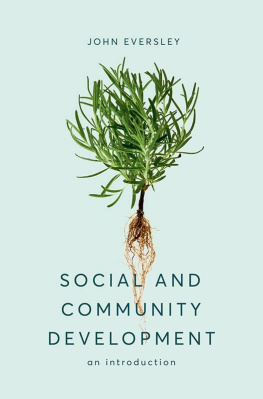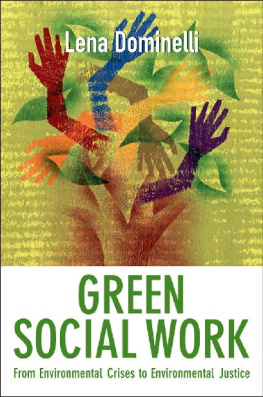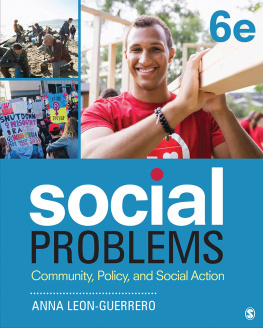
First published in Great Britain in 2019 by
Policy Press | North America office: |
University of Bristol | Policy Press |
1-9 Old Park Hill | c/o The University of Chicago Press |
Bristol | 1427 East 60th Street |
BS2 8BB | Chicago, IL 60637, USA |
UK | t: +1 773 702 7700 |
t: +44 (0)117 954 5940 | f: +1 773-702-9756 |
www.policypress.co.uk | www.press.uchicago.edu |
Policy Press 2019
British Library Cataloguing in Publication Data
A catalogue record for this book is available from the British Library
Library of Congress Cataloging-in-Publication Data
A catalog record for this book has been requested
978-1-4473-4154-3 hardback
978-1-4473-4156-7 paperback
978-1-4473-4155-0 ePdf
978-1-4473-4157-4 ePub
978-1-4473-4158-1 Mobi
The right of Lena Dominelli to be identified as author of this work has been asserted by her in accordance with the Copyright, Designs and Patents Act 1988.
All rights reserved: no part of this publication may be reproduced, stored in a retrieval system, or transmitted in any form or by any means, electronic, mechanical, photocopying, recording, or otherwise without the prior permission of Policy Press.
The statements and opinions contained within this publication are solely those of the author and not of the University of Bristol or Policy Press. The University of Bristol and Policy Press disclaim responsibility for any injury to persons or property resulting from any material published in this publication.
Policy Press works to counter discrimination on grounds of gender, race, disability, age and sexuality.
Cover design by Andrew Corbett
Front cover image: Getty
Printed and bound in Great Britain by CMP, Poole
Policy Press uses environmentally responsible print partners
To my mum and heroic women like her who struggle with the issues of everyday life to create a better world for others. Your love creates guiding stars in a vast universe of labour.
Contents
List of boxes and figures
Boxes
Figures
Acknowledgements
Womens position in society remains contested. There have been gains since I first wrote on this topic, but there have been losses as well. Much depends on the country and its socio-political and economic contexts. However, a lot remains to be done internationally. The Beijing Declaration and Platform for Action (BDPFA) for women, which contained women-friendly policies for countries to follow, has not been realised as had been anticipated during the heady days in Huairou near Beijing where the NGO meetings were held in 1995 when the BDPFA was first promulgated in one of the largest gatherings of women globally. Meanwhile, China has since become a superpower with unparalleled economic growth and substantial improvements in the standards of living of all its citizens regardless of gender. At the same time, the growing popularity of Confucian cultural ideals has reinforced views of women that link them to family responsibilities, especially in its extended forms. While many Chinese women have been overseas and completed PhDs, like their male compatriots, these women now worry about whether they are too old to be married or whether any man would want them as strong women. This is occurring in a country where men considerably outnumber women. Their stories remind me of the continued fragility of feminist gains.
I have obtained narratives from countless women across the world, having visited and undertaken research in all the five regions identified by the United Nations. I have been honoured by the numbers of women who willingly shared their accounts with me, letting me into their lives, much as they would a friend, although we had only just met. They made me aware of their many strengths; commitment to family and communities; and resilience in the face of countless hardships as we cried and laughed together. They made me realise the importance of including community development and womens work in disaster situations in the third edition of this book, and for this I will be eternally grateful. I hope their heroism shines through my representations of their words and provides lessons for men, women and children seeking to improve their communities.
I also thank the many women who have encouraged me in my work; they are too numerous to mention, but I thank them from my heart for their encouragement and support, given willingly and unstintingly. I also give unending thanks to specific women who have been there for me whenever I have needed them my mother, Maria, Rita, Connie, Marilyn. I have lost many friends who helped form my ideas to the grim reaper. Of these, I give special recognition to Malvina Ponce de Leon, a great Chilean social worker who played an enormous role in developing social work in Latin America. She deserves the highest honours that social work can give, even posthumously. Malvinas inspiration will always live in my heart.
I also thank important men in my life my dad, who encouraged me to see that men and women were equal from the moment I entered the world, and who I still miss despite the years since his passing; David, Nicholas, Nic, Sam, Dan, Al, Matt, Dayton, Joseph, Jacob and Marco, your love and support have been invaluable.
And I wish to thank many cohorts of MSW (Master of Social Work) students who have inspired me with their questions and insights. I pay special tribute to the Durham MISWCD (Master in International Social Work and Community Development) students from 2016 to 2018 whose creativity and keenness to support people in need have been astounding. I take this opportunity to wish you all the best in building the better world you deserve and want for us all. Thanks also go to my social work colleagues, especially Janice, Josie, Jane, Sui Ting, Sarah, Roger and Simon; Susan, Nicole, Louise, Karen, Stefan; and Claire at Durham University. Your constant encouragement has seen me through testing times. Finally, I congratulate and thank Catherine Gray, now Commissioning Editor at Policy Press, for her determination and support in ensuring that the third edition actually got written. And to Jo Campling, responsible for the first edition. She would be proud of us both.
Thank you everyone. I am humbled by your knowledge and encouragement.
Preface: actioning our futures from our pasts
Women and men occupy different spaces in their communities. Feminist social action has challenged the assignation of women to the private sphere of the home and their exclusion from the public arena, especially those elements involving paid employment, political representation and leadership in key global corporations and institutions. After several decades of feminist organising in all three of these domains achieving some progress, there remains a long way to go. Shortcomings include lack of equal representation in governance issues; lack of engagement in decision-making processes; and lack of political representation and leadership in large multinational corporations. Women have been involved in sustained action in their communities for centuries as they have sought to improve conditions for their children, wider family networks and themselves. Moreover, the story of gendered social relations varies from country to country, especially with regard to historical, social, political and cultural contexts. Moreover, progress has been uneven, with different countries holding pride of place in some areas for example, parliamentary political representation is extremely high in Rwanda, yet this advance is accompanied by extensive levels of poverty, particularly among women. In the West, women continue to press for higher levels of political representation, for example the 50:50 campaign in the United Kingdom to equalise representation among men and women members of Parliament. Only a few women have broken the glass ceiling in large corporations. Meanwhile, violence in intimate relationships bedevils social relations in all countries.







